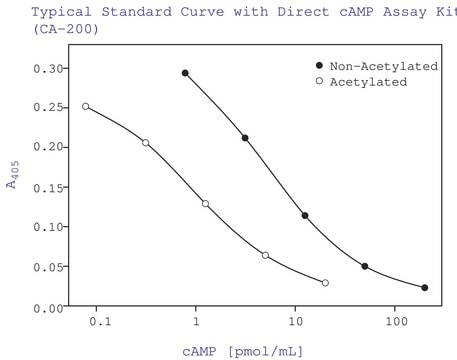CG200
cGMP Enzyme Immunoassay Kit, Direct
sufficient for 96 assays
Sign Into View Organizational & Contract Pricing
All Photos(1)
About This Item
UNSPSC Code:
12161503
NACRES:
NA.84
Recommended Products
usage
sufficient for 96 assays
Quality Level
technique(s)
ELISA: suitable
shipped in
wet ice
storage temp.
−20°C
Gene Information
human ... PRKG1(5592) , PRKG2(5593)
Application
Non-radioactive, competitive immunoassay for the quantitation of total cGMP in tissue and cell cultures. Buffer contains 0.1N HCl that aids in the lysis of cells, inhibits endogenous phosphodiesterases and stabilizes the cyclic nucleotides. This kit uses a polyclonal antibody to cGMP to competitively bind cGMP or cGMP that has been covalently linked to an alkaline phosphatase molecule. The assay is performed in a 96 well plate coated with anti-rabbit IgG antibody. The colored end product, produced by the addition of substrate to the wells, is read at 405 nm on a multiwell plate reader. The intensity of the color is inversely proportional to the concentration of cGMP present in the well.
Please refer to the attached Protocolfor details.
Kit Components Only
Product No.
Description
- 0.1 M Hydrochloride Acid 1 x 30
- Acetic Anhydride 1 x 1
- cGMP-Alkaline Phosphatase Conjugate 1 x 5
- cGMP EIA Antibody Rabbit Anti-cGMP 1 x 5
- Cyclic GMP Standard 1 x 0.5
- Goat Anti-Rabbit IgG Coated 96 Well Microtiter Plate 1 ea
- Neutralizing Reagent 1 x 6
- p-Nitrophenyl Phosphate Substrate Solution 1 x 20
- Plate Sealer 1 ea
- Stop Solution 1 x 5
- Triethylamine 1 x 2
- Wash Buffer Concentrate 1 x 30
See All (12)
Signal Word
Danger
Hazard Statements
Precautionary Statements
Hazard Classifications
Acute Tox. 2 Inhalation - Acute Tox. 3 Dermal - Acute Tox. 4 Oral - Eye Dam. 1 - Flam. Liq. 3 - Met. Corr. 1 - Skin Corr. 1A - STOT SE 3
Target Organs
Respiratory system
Supplementary Hazards
Storage Class Code
3 - Flammable liquids
Flash Point(F)
120.2 °F
Flash Point(C)
49 °C
Choose from one of the most recent versions:
Already Own This Product?
Find documentation for the products that you have recently purchased in the Document Library.
Madiha A H Hassan et al.
BMC pharmacology, 5, 10-10 (2005-04-09)
Cardiac hypertrophy is a major risk factor for morbidity and mortality in a number of cardiovascular diseases. Consequently, the signaling pathways that inhibit cardiac hypertrophy are currently receiving much interest. Among them, nitric oxide (NO), signaling via cGMP and cGMP-dependent
Nadežda Lukáčová et al.
Frontiers in physiology, 11, 700-700 (2020-07-14)
We previously reported NO/sGC signaling in the upper respiratory pathway, receiving input from the respiratory neurons of the brainstem to phrenic motoneurons in the C3-C6 spinal cord. In order to assess whether innervation of the neuromuscular junction (NMJ) at the
Yuichiro Kunai et al.
Journal of the American Chemical Society, 139(43), 15328-15336 (2017-10-08)
The concept of electrical energy generation based on asymmetric chemical doping of single-walled carbon nanotube (SWNT) papers is presented. We explore 27 small, organic, electron-acceptor molecules that are shown to tune the output open-circuit voltage (V
Rachael P Norris et al.
Reproduction (Cambridge, England), 140(5), 655-662 (2010-09-10)
The meiotic cell cycle in mouse oocytes is arrested in prophase, and then restarted when LH acts on the surrounding granulosa cells. The granulosa cells keep meiosis arrested by providing a source of cGMP that diffuses into the oocyte through
Lance M Wheeler et al.
Nature communications, 8(1), 1722-1722 (2017-11-25)
Materials with switchable absorption properties have been widely used for smart window applications to reduce energy consumption and enhance occupant comfort in buildings. In this work, we combine the benefits of smart windows with energy conversion by producing a photovoltaic
Our team of scientists has experience in all areas of research including Life Science, Material Science, Chemical Synthesis, Chromatography, Analytical and many others.
Contact Technical Service










